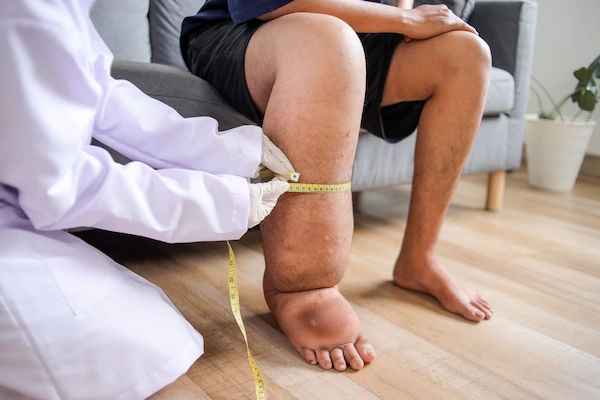Neck Pain: Causes, Symptoms and Treatments
Discover the common causes, symptoms, treatments, and prevention tips for neck pain. Learn how to manage discomfort at home and when to seek medical help.

Written by Dr. Siri Nallapu
Reviewed by Dr. Shaik Abdul Kalam MD (Physician)
Last updated on 14th Aug, 2025

Neck pain is a common issue that affects people of all ages. Whether it’s due to poor posture, stress, or an underlying condition, neck pain can be uncomfortable and disruptive to daily life. The good news is that most cases of neck pain are not serious and can be managed with simple treatments and lifestyle changes.
In this article, we’ll explore the causes, symptoms, and effective treatments for neck pain, along with tips to prevent it.
What Causes Neck Pain?
Neck pain can arise from various factors, including:
- Poor Posture – Slouching while sitting, hunching over a phone or computer, or sleeping in an awkward position can strain neck muscles.
- Muscle Strain – Overuse of neck muscles (e.g., long hours of driving or working at a desk) can lead to stiffness and pain.
- Injury or Trauma – Whiplash from car accidents, falls, or sports injuries can cause neck pain.
- Wear and Tear (Osteoarthritis) – As we age, the joints and discs in the neck can degenerate, leading to chronic pain.
- Herniated Disc – A slipped or bulging disc in the spine can press on nerves, causing neck pain and even radiating pain to the arms.
- Stress and Tension – Emotional stress often leads to muscle tightness in the neck and shoulders.
- Medical Conditions – Conditions like meningitis, fibromyalgia, or rheumatoid arthritis may also cause neck pain.
Symptoms of Neck Pain
Neck pain can vary from mild discomfort to severe pain. Common symptoms include:
- Stiffness – Difficulty moving the neck, especially after waking up.
- Sharp or Dull Pain – Pain that may be localized or spread to the shoulders, arms, or head.
- Headaches – Neck pain often triggers tension headaches.
- Numbness or Tingling – If a nerve is compressed, you may feel pins and needles in your arms or hands.
- Weakness – Reduced strength in the arms or hands in severe cases.
If your neck pain is accompanied by fever, severe headache, difficulty swallowing, or loss of bladder/bowel control, seek medical attention immediately, as these could indicate a serious condition.
How to Treat Neck Pain at Home
Most mild to moderate neck pain can be managed with self-care. Here are some effective home remedies:
1. Rest and Gentle Movement – Avoid sudden movements but keep the neck mobile with slow stretches.
2. Heat or Ice Therapy
Ice Packs (for the first 48 hours after injury) help reduce swelling.
Heat Pads (after 48 hours) relax stiff muscles.
3. Over-the-Counter Pain Relievers – Medications like ibuprofen or acetaminophen can help reduce pain and inflammation.
4. Neck Stretches and Exercises – Simple stretches (like chin tucks and side bends) can improve flexibility and relieve tension.
5. Improve Posture – Keep your head aligned with your spine while sitting or standing.
6. Ergonomic Adjustments – Adjust your workstation, chair, and computer screen to reduce strain.
When to See a Doctor
While most neck pain improves with home care, consult a doctor if:
- Pain persists for more than a week.
- Pain worsens or spreads to arms/legs.
- You experience numbness, weakness, or tingling.
- Neck pain follows an injury (e.g., a fall or accident).
A doctor may recommend:
- Physical Therapy – Strengthening and structural issues are suspected.
In rare cases, surgery may be needed for conditions like herniated discs or spinal stenosis.
Preventing Neck Pain
You can reduce the risk of neck pain by making small lifestyle changes:
- Maintain Good Posture – Keep your shoulders back and avoid slouching.
- Take Breaks from Screens – Every 30 minutes, stretch and look away from your computer/phone.
- Use a Supportive Pillow – Choose a pillow that keeps your neck aligned while sleeping.
- Stay Active – Regular exercise strengthens neck and shoulder muscles.
- Manage Stress – Practice relaxation techniques like deep breathing or yoga.
Need Help? Consult a Specialist
If your neck pain is persistent or severe, don’t ignore it. Early treatment can prevent complications. You can easily book a consultation with an orthopedic specialist or physiotherapist through Apollo 24|7 for expert advice and personalized care.
Final Thoughts
Neck pain is common but manageable. By understanding its causes, recognizing symptoms early, and adopting healthy habits, you can keep your neck pain-free. If home remedies don’t help, seek professional guidance to ensure long-term relief.
Would you like to schedule a consultation or a diagnostic test? Visit Apollo 24|7 today for expert care.
Consult an Orthopedic doctor for the best advice
Consult an Orthopedic doctor for the best advice
Dr. Anil Sharma
Orthopaedician
42 Years • MBBS, MS Orthopedics
New Delhi
AAKASH MEDSQUARE, New Delhi

Dr. Anil Pradeep Jadhav
Orthopaedician
23 Years • MBBS MS (Ortho)
Nashik
Apollo Hospitals Nashik, Nashik
(25+ Patients)

Dr. Mriganka Ghosh
Orthopaedician
11 Years • MD (Physician), DNB (Orthopaedics)
Howrah
Dr Mriganka Mouli Ghosh, Howrah

Dr. Pradeep Lucas
Orthopaedician
7 Years • MBBS, Diploma in Orthopaedics, Fellowship in DFSI
Bengaluru
Revival Multispeciality Clinic, Bengaluru

Dr. Manoj Dinkar
Orthopaedician
15 Years • MBBS, Dip (Orthopaedics)
New Delhi
THE DOCTORS NESST, New Delhi




